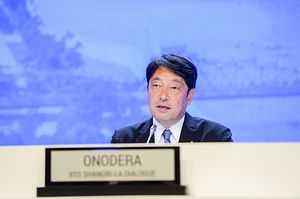At this year’s Shangri-La Dialogue, Japan could rest assured that – with the twin foci on reintroducing the “Indo-Pacific” concept and spotlighting Chinese rule-breaking behavior (as Ankit covers excellently here) – many of its concerns are shared by the rest of the region and the world. Maritime issues were front and center in many of Japan’s sideline meetings, including the trilateral meeting with the United States and Australia on Saturday and with the U.S. and South Korea on Sunday.
However, if Japan was hoping that the Shangri-La Dialogue would be an opportunity to reaffirm that “maximum pressure” would be exerted on North Korea, Japan was set up to be disappointed by U.S. and South Korean optimism. Though the three sides confirmed their common goal is North Korea’s complete, verifiable, and irreversible denuclearization, the term “maximum pressure” – used at the last trilateral meeting in October – was dropped because U.S. President Donald Trump did not appreciate the phrase, now that Washington and Pyongyang are “getting along.” Another issue that will continue to be a hindrance to trilateral unity is the issue of Japanese abductees.
North Korean denuclearization also came up in the trilateral meeting with the United States and Australia, and was also an issue in Japanese Defense Minister Itsunori Onodera’s meetings with his British, German, and Philippine counterparts.
In their respective speeches, Onodera and South Korean Defense Minister Song Young-moo verbally sparred over the sincerity of North Korean overtures. However, there was some constructive movement in the Japan-South Korea bilateral relationship front. During Onodera and Song’s bilateral meeting, the possibility was raised that a Japanese Maritime Self-Defense Force vessel could visit South Korea in October to coincide with the 70th anniversary of the founding of the South Korean military. If this port visit succeeds, it will be a significant step forward in this long-moribund relationship.
Bilateral developments outside of the Shangri-La Dialogue and in support of a “free and open Indo-Pacific” are continuing apace as well. Back in Japan, concurrent with the Shangri-La Dialogue, Vietnamese President Tran Dai Quang was meeting with Prime Minister Shinzo Abe to strengthen defense cooperation in military training, equipment, and technology between their two countries.
Furthermore, the Japanese and French governments are working to establish a new “maritime dialogue” mechanism. Officials hope that the mechanism, proposed by the French side, will be agreed to in mid-July when Abe visits President Emmanuel Macron in France. France is interested in maintaining security in the region because of its overseas territories – New Caledonia and French Polynesia – which host French military bases as well.
As many analysts have already observed, with the downgrading of Chinese participation and by dint of the Dialogue’s informal nature – which is both its greatest asset and detraction – the Dialogue did not accomplish anything radically new or concrete for Japan this year. However, Onodera did score key meetings, and if nothing else, the regional momentum continues to favor Japan’s position, a momentum that appears to generate positive spillover effects in Japan’s relationship with other key countries, including South Korea, Vietnam, and France.

































